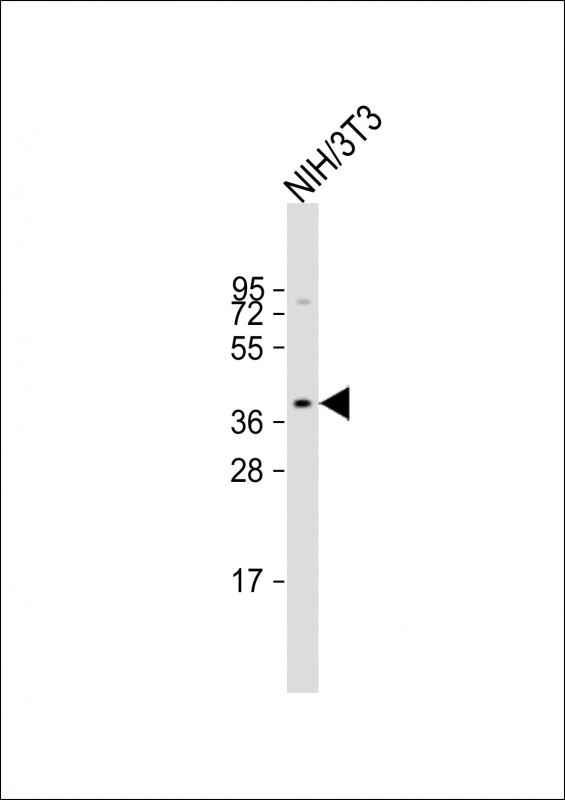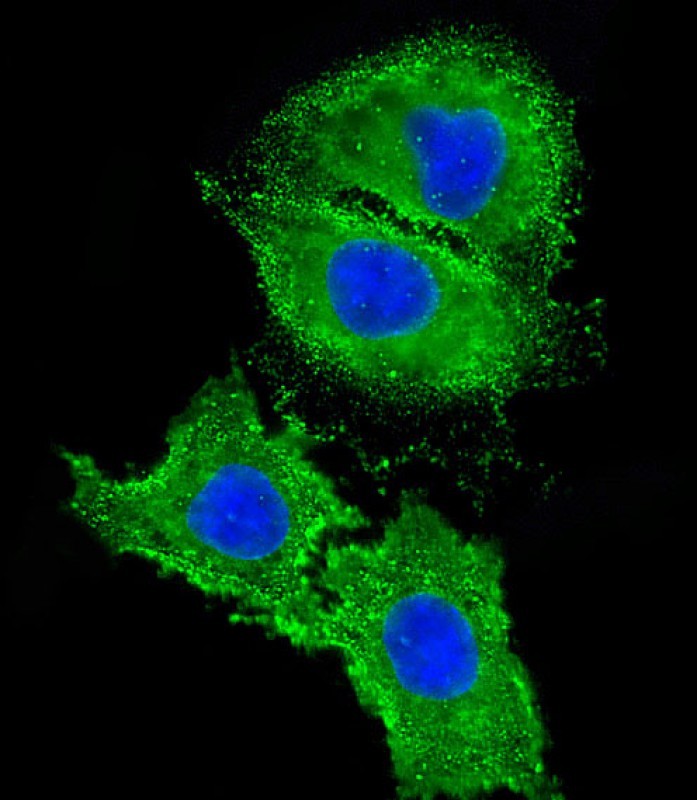

| WB | 1/2000 | Human,Mouse,Rat |
| IF | 咨询技术 | Human,Mouse,Rat |
| IHC | 咨询技术 | Human,Mouse,Rat |
| ICC | 1/25 | Human,Mouse,Rat |
| FCM | 咨询技术 | Human,Mouse,Rat |
| Elisa | 咨询技术 | Human,Mouse,Rat |
| Aliases | Type-1 angiotensin II receptor, AT1AR, AT1BR, Angiotensin II type-1 receptor, AT1, AGTR1, AGTR1A, AGTR1B, AT2R1, AT2R1B |
| Entrez GeneID | 185 |
| WB Predicted band size | 41.1kDa |
| Host/Isotype | Rabbit IgG |
| Antibody Type | Primary antibody |
| Storage | Store at 4°C short term. Aliquot and store at -20°C long term. Avoid freeze/thaw cycles. |
| Species Reactivity | Human, Mouse, Rat |
| Immunogen | This AGTR1 antibody is generated from rabbits immunized with a KLH conjugated synthetic peptide between 211-240 amino acids from the Central region of human AGTR1. |
| Formulation | Purified antibody in PBS with 0.05% sodium azide. |
+ +
以下是关于AGTR1抗体的3篇参考文献及其摘要概括:
1. **"AGTR1 blockade inhibits tumor progression in ovarian cancer"**
- **作者**: Smith A, et al.
- **摘要**:研究报道AGTR1抗体通过抑制血管紧张素II受体信号通路,降低卵巢癌细胞增殖和转移,并增强化疗敏感性,提示其在癌症治疗中的潜力。
2. **"Anti-AGTR1 autoantibodies contribute to vascular dysfunction in preeclampsia"**
- **作者**: Zhang L, et al.
- **摘要**:该文献发现妊娠高血压患者体内存在的抗AGTR1自身抗体可激活受体,导致血管收缩和内皮损伤,为子痫前期的发病机制提供了新解释。
3. **"AGTR1-targeted antibody therapy attenuates cardiac fibrosis in hypertension models"**
- **作者**: Tanaka K, et al.
- **摘要**:实验证明,特异性AGTR1抗体可阻断血管紧张素II介导的心脏成纤维细胞活化,显著减轻高血压模型中的心肌纤维化和心室重构。
4. **"AGTR1 as a biomarker for immunotherapy response in renal cell carcinoma"**
- **作者**: Wang Y, et al.
- **摘要**:研究显示AGTR1高表达的肾癌患者对免疫检查点抑制剂反应更佳,AGTR1抗体可能通过调节肿瘤微环境增强抗肿瘤免疫应答。
以上文献涵盖AGTR1抗体在癌症、妊娠疾病及心血管疾病中的机制与应用研究。
The angiotensin II type 1 receptor (AGTR1), a G protein-coupled receptor, plays a central role in the renin-angiotensin system (RAS), regulating blood pressure, fluid balance, and cardiovascular homeostasis. It binds angiotensin II, a potent vasoconstrictor, triggering signaling pathways that influence vascular contraction, aldosterone secretion, and cell proliferation. Dysregulation of AGTR1 is linked to hypertension, cardiac hypertrophy, renal disease, and fibrosis, making it a key therapeutic target. Drugs like ARBs (angiotensin receptor blockers) inhibit AGTR1 to manage these conditions.
AGTR1 antibodies are essential tools for studying receptor expression, localization, and function in research. They are used in techniques such as Western blotting, immunohistochemistry, and flow cytometry to detect AGTR1 levels in tissues or cells, particularly in cardiovascular or cancer studies. In cancer, AGTR1 overexpression has been associated with tumor progression, angiogenesis, and metastasis, suggesting its potential as a biomarker or therapeutic target. Some studies also explore autoantibodies against AGTR1 in preeclampsia and autoimmune disorders, highlighting their pathological role.
These antibodies are typically monoclonal or polyclonal, raised against specific epitopes of the receptor’s extracellular or intracellular domains. Their applications extend to elucidating RAS mechanisms, evaluating drug efficacy, and exploring AGTR1’s interplay with other signaling pathways in disease models.
×